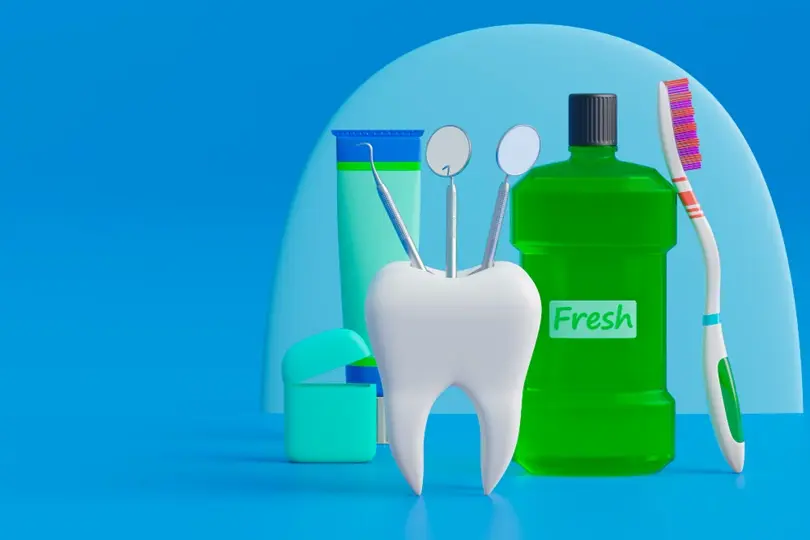
Healthy teeth are essential for more than just a confident smile. They play a vital role in overall well-being. This article explores just five ways to safeguard your teeth.
1. Brush Properly Twice a Day
Brushing forms the cornerstone of dental hygiene because it removes plaque and food particles that accumulate throughout the day. When plaque remains on teeth, it hardens into tartar, which can lead to cavities and gum disease. Consistent brushing twice daily helps maintain enamel integrity and reduces bacterial buildup. Using gentle, thorough strokes ensures teeth and gums stay clean without causing abrasion. Brushing also supports fresh breath and overall oral comfort, making it a simple yet powerful habit. While brushing alone cannot prevent every dental issue, it significantly lowers the risk of problems that require complex treatments later. A strong brushing routine creates a foundation for dental health that benefits both appearance and function. When combined with other preventive measures, brushing becomes part of a comprehensive approach to preserving teeth for life.
To get the best results, you could do the following:
- Brush for at least two minutes
- Use a soft-bristle toothbrush
- Hold the brush at a 45-degree angle
- Use gentle, circular motions
- Replace your toothbrush every 3 months
Consistent brushing ensures fresher breath, healthier gums, and fewer dental issues. While brushing can’t prevent every problem, it significantly lowers the risk of cavities and gum disease.
2. Floss Daily to Clean the Hard-to-Reach Areas
Flossing often feels tedious, and many people admit they skip it because it seems time-consuming. However, its impact on dental health is undeniable. Flossing reaches areas between teeth that brushing cannot, removing plaque and food particles that contribute to decay and gum inflammation. Building a flossing routine takes patience, but even small steps—such as flossing once a day—make a noticeable difference over time. Creating consistency may involve setting reminders or pairing flossing with another habit, like brushing at night. While it may feel inconvenient at first, the long-term benefits include healthier gums, fewer dental complications, and a stronger smile. Flossing is not about perfection; it’s about progress and commitment to dental health. By embracing this habit, individuals protect their teeth from issues that brushing alone cannot address.
Benefits of daily flossing include the following:
- Reduced gum inflammation
- Lower risk of cavities
- Improved overall gum health
- Fresher breath
If you struggle with consistency, try floss picks, water flossers, or set a reminder on your phone. What matters most is making flossing a part of your daily routine.
3. Use High-Quality Dental Products

The quality of dental care products influences how effectively teeth are preserved. Items designed to strengthen enamel, support gum health, and maintain cleanliness contribute to better long-term outcomes. Reliable products ensure that daily routines deliver results without causing harm to teeth or soft tissues. While the market offers countless options, focusing on products that align with professional recommendations helps maintain safety and effectiveness. Consistent use of high-quality products reduces the risk of cavities, gum disease, and enamel erosion. Good products complement proper technique, creating a balanced approach to oral care. Investing in quality is not about luxury. It’s about prevention and protection. When combined with regular dental checkups, these choices help maintain a healthy smile and avoid costly restorative treatments later.
Choose items that are dentist-recommended and offer proven benefits, such as the following:
- Fluoride toothpaste for strengthening enamel
- Antimicrobial mouthwash to reduce bacteria
- Electric toothbrushes for deeper cleaning
4. Protect Your Teeth With a Mouthguard
Protecting teeth during sleep (if you grind your teeth) or sports activities plays a critical role in preventing damage that can lead to tooth loss. Teeth grinding, or bruxism, often occurs unconsciously during sleep and places excessive pressure on teeth, causing enamel wear, fractures, and even loosening over time. This constant strain can also affect the temporomandibular joint (TMJ), leading to jaw pain, headaches, and difficulty chewing. Similarly, impact during physical activity can result in chips, cracks, or complete tooth loss. Missing teeth could create functional challenges and may lead to restorative solutions such as implants. Dental implants restore both appearance and function, and advanced techniques like full arch dental photogrammetry improve precision during implant placement, reducing adjustments and streamlining treatment. Wearing a mouthguard minimizes the risk of trauma and grinding-related damage, preserving natural teeth, protecting jaw health, and avoiding complex procedures later.
Nighttime teeth grinding (bruxism) can quietly damage teeth over time, leading to the following:
- Enamel wear
- Tooth fractures
- Jaw pain or TMJ issues
5. Take Care of Your Mental Health
Mental health strongly influences dental care habits. Depression or high anxiety often leads to neglecting basic self-care, including brushing and flossing. Over time, this neglect increases the risk of cavities, gum disease, and tooth loss. Emotional well-being supports consistency in hygiene routines and encourages timely dental visits. Stress management and mental health care are not just about feeling better—they directly impact physical health, including teeth. When individuals maintain balance and seek support for mental health challenges, they are more likely to follow preventive practices and address dental concerns promptly. Dental health and mental health are deeply connected, and recognizing this relationship helps create a holistic approach to well-being. Preserving teeth starts with caring for the mind as much as the body.
Poor mental health can lead to the following:
- Increased plaque buildup
- Higher risk of cavities
- Gum disease
- Teeth grinding
Managing stress, practicing self-care, and seeking support when needed can help improve your oral hygiene consistency and overall well-being. A healthy mind supports healthy habits—and healthy teeth.
Conclusion
Preserving teeth may seem like it’s a lot, but it doesn’t have to be. A good dental care routine that works for you can do wonders.
Photo Credit:
Photo 1, Credit to Freepik || Photo 2, Credit to Freepik (CC0 1.0)




